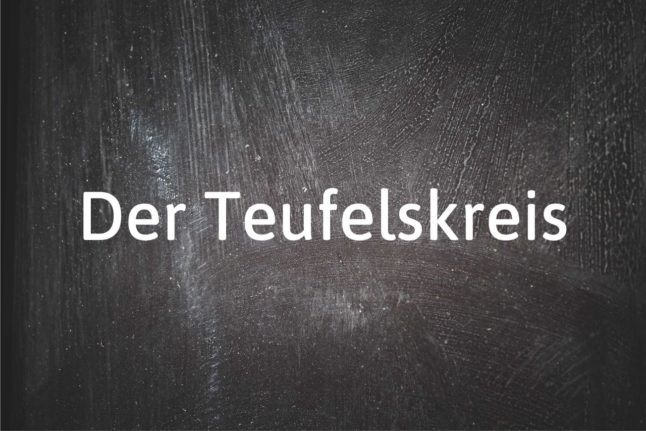Der Teufelskreis literally means devil’s circle and describes a seemingly hopeless situation that is created by a chain of unpleasant, mutually dependent events.
We have a version of this in English, a vicious circle, but the German speakers go one step further with the expression. Getting locked in an inescapable cycle can be immensely frustrating, so they suggest the devil must have some influence in this chain reaction.
The German word, like the English, has its origins in the latin circulus vitiosus. Though vitiosus is usually translated to vicious, it can also mean wicked or malicious, so the Germanics choose to translate it to devil, the embodiment of evil.
Unfortunately, a Teufelskreis can be quite common. Most of us are familiar with being so worried about a work presentation or school exam that we spend more of our time being anxious than actually preparing for it.
The below tweet reads: “Motivation to learn for the Abitur (up), anxiety because I haven’t learned anything for the Abitur (down). It’s just a vicious circle.”
Motivation für‘s Abi zu lernen:📉
Anxiety weil ich noch nichts für‘s Abi gelernt hab:📈
Es ist einfach ein Teufelskreis— Inga (@ingogayflamingo) April 20, 2021
You may also encounter a common Teufelskreis when learning a new language. If you find you are nervous to make mistakes and don’t push yourself to speak the language with locals, you will not improve as quickly and so are more likely to make basic mistakes, building upon the initial anxiety. This is a Teufelskreis; a sequence of events that worsens your initial situation.
READ ALSO: 10 German words that strike fear into the hearts of language learners
Der Teufelskreis is a fairly everyday term and often appears in popular culture. In 2008, the German rapper and hip hop artist Alligatoah released his hit track Teufelskreis, which explores the vicious circle of violence.
The word Teufel, meaning devil or demon, actually crops up in German colloquialisms more than you might expect. Examples include der Teufelsgeiger, meaning a passionate virtuoso violinist, and die Teufelskunst, or black magic.
Examples:
Es handelt sich um einen Teufelskreis.
It is a vicious circle.
Er konnte aus dem Teufelskreis von Hass ausbrechen.
He was able to escape the vicious circle of hate.



 Please whitelist us to continue reading.
Please whitelist us to continue reading.
Member comments